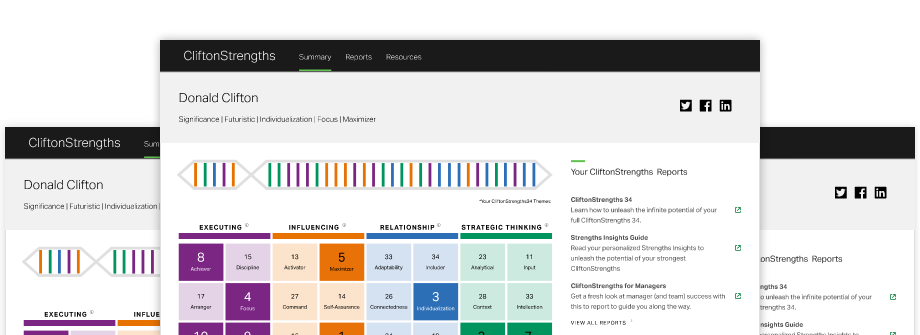
Leadership Development: What It Is and Why It Matters
- How Important Is Training for Leaders?
- What Is Leadership Coaching?
- What Will a Leader Learn in Leadership Training and Development?
- The Business Case for Executive or Leadership Coaching and Development
- Gallup's Leadership and Management Certifications
- Gallup's Leadership Team Development: Improving Executive Team Effectiveness
01 How Important Is Training for Leaders?
Leadership training is crucial to organizational success. It can play a key role in the performance of leaders and managers. Each leader's capacity for success in their role is the result of natural talent combined with intentional development. Too often, organizations ignore or underinvest in the intentional development of leaders and managers.

Training for leaders comes in many forms, from formal development programs to mentorship and executive leadership coaching.
The most effective leadership training fosters leaders' authentic growth -- it develops a powerful leadership mindset and goes well beyond the teaching of leadership strategies and tactics. The best leadership development gives leaders the key experiences and focused development they need to grow.
When leadership development is meaningful and scientifically grounded, it can mean the difference between success and failure for some leaders, which can cascade through an organization.
Leadership training: It's for managers, too.
The demands of the modern workplace require that managers be equipped to fulfill some functions traditionally reserved for leadership. And because the manager influences 70% of a team's engagement, manager development is especially important to team success.
To succeed, managers need to acquire these seven leadership competencies:
- Build relationships: Create partnerships, build trust, share ideas and accomplish work.
- Develop people: Help others become more effective through strengths, expectations and coaching.
- Drive change: Embrace change and set goals that align with a stated vision.
- Inspire others: Encourage others through positivity, vision, confidence, challenges and recognition.
- Think critically: Gather and evaluate information that leads to smart decisions.
- Communicate clearly: Share information regularly and concisely.
- Create accountability: Hold oneself and one's team responsible for performance.
02 What Is Leadership Coaching?
Before a leader acquires a coach, it's important to define leadership coaching.
Leadership coaching is the act of guiding, advising, encouraging, challenging or developing an organizational leader to improve their performance, achieve desired metrics or reach organizational outcomes. Leadership coaches help leaders live out their purpose and accomplish their goals by having the right conversations.
Typically conducted in a one-on-one setting, coaching sessions allow leaders to troubleshoot difficulties, ask challenging questions, explore opportunities and discuss important topics.

In a CliftonStrengths® coaching session, the leader's natural talents are part of the discussion as a way to spur development and tap into a leader's limitless potential.
Coaching isn't just for novice leaders. Every leader, regardless of tenure and experience, benefits from coaching. Coaching provides a unique adviser that many leaders are unable to otherwise access.
Leaders often find that coaches help them to adapt to a new position, expand their sphere of influence, appreciate their natural strengths, clarify strategic visions and much more.
One notable type of leadership coaching is executive leadership coaching. Because executive leadership affects an entire organization, all executives stand to benefit from the aid of a coach. Coaches are thought partners and confidants to executives who are navigating the demands of leadership.
03 What Will a Leader Learn in Leadership Training and Development?
Leadership training and executive leadership training come in many shapes and sizes. Leaders can be exposed to new key experiences, mentorship, coaching, workshops, leadership team sessions, CliftonStrengths sessions, classroom learning and more.
In these developmental activities, a leader might expect to learn any number of things, depending on the needs of the leader and the organization. A leader might learn about:
- coaching employees
- identifying employees' natural talents
- developing employees' strengths
- engaging employees
- performance management
- communicating clearly and effectively
- developing their own unique style of leadership
- making better decisions by managing their strengths and weaknesses
- driving desired organizational outcomes
- creating relationships built on trust and transparency
- activating their organization's mission, vision and values
- fostering innovation, managing crises, and creating and adapting to change
Gallup's newest leadership training, called Leadership Team Effectiveness: Accelerate Purpose & Development, offers a combination of elements to develop the effectiveness of an entire leadership team:
1 The program begins with a Gallup analysis of how well strategic initiatives align in the organization and how purpose and values flow throughout it.
2 Then, members of the leadership team learn their CliftonStrengths and engage in one-on-one coaching with a Gallup strengths coach.
3 Finally, the leadership team attends a one-day workshop to create a clear identity, understand the state of the organization, align priorities and create a strategic plan. Gallup holds a team call and guides the discussion to maintain momentum on the team's progress.
04 The Business Case for Executive or Leadership Coaching and Development
When leaders have adequate development, they have the power to create exceptional organizational performance, which makes leadership development, including executive leadership training, vitally important. When leaders thrive, so do organizations.

- When employees strongly agree that they trust the leadership of their organization, they are 4x as likely to be engaged.
- Employees who strongly agree that leaders help them see how changes made today will affect their organization in the future are 7.5x as likely to feel connected to their company culture.
- When employees strongly agree that the leadership of their organization communicates effectively with the rest of the organization, they are 73% less likely to feel burned out at work.
- 69% of employees who strongly agree that their leaders make them "feel enthusiastic about the future" are engaged. Only 1% of those who disagree with the statement are engaged.
When Leaders Learn to Use Their Strengths
Gallup courses and coaching, including executive training, often help leaders understand, develop and apply their natural strengths, which has a powerful effect on business outcomes. People who use their strengths every day are:

When Leaders Learn to Engage Employees and Themselves
Gallup courses and coaching often teach leaders to engage employees and to foster their own engagement. In studying the effect engagement has on the performance of business units and teams, Gallup discovered that the benefits of engagement are clear. When evaluating employee engagement levels, Gallup found that compared to the bottom-quartile business units and teams, the top-quartile saw the following benefits:
Learn more about the effects of engagement on team and business unit performance.
05 Gallup's Leadership and Management Certifications
For leaders and managers who want to enhance their abilities and make public their achievement, Gallup offers a CliftonStrengths coaching certification and a management certification. These certifications equip leaders and managers to successfully lead and support teams and organizations.
Gallup-Certified Manager
Throughout this manager certification, participants master the essentials of exceptional team leadership. Leaders and managers take leadership training courses that prepare them to develop employee strengths, engage employees and use the latest in performance management techniques.
Gallup-Certified CliftonStrengths Coach
Participants learn to coach employees to understand, appreciate, develop and leverage their natural strengths in pursuit of higher performance and engagement.
06 Gallup's Leadership Team Development: Improving Executive Team Effectiveness
Gallup often finds that executive teams have wildly different ideas of purpose -- making cascading alignment companywide more challenging. Gallup's solution, Leadership Team Effectiveness: Accelerate Purpose & Performance, helps executives determine and clarify their organization's purpose, mission and values and use their collective strengths to lead in the present and future.
Designed to make a leadership team more successful and improve an organization's performance, this solution allows you to align leaders around a powerful purpose while developing each unique leader.
This leadership team development combines CliftonStrengths exploration with workshopping, group discussion, reflection and team alignment around a unified purpose.
The components of this solution are as follows:

Artifact review: Gallup studies how purpose and values cascade in your organization.
Stakeholder interviews: Gallup identifies current strategic initiatives and determines how clear and aligned they are throughout your organization.

CliftonStrengths 34 Report + CliftonStrengths for Leaders Report: Leaders learn their CliftonStrengths theme sequence and think about how their unique strengths can help them lead.
One-on-one coaching: Leaders explore their strengths in an individualized way with a Gallup professional strengths coach.

One-day leadership workshop and facilitated team strategy session: The leadership team forges a clear identity through the lens of strengths, studies the current state of the organization, aligns top priorities and objectives, and creates a strategic plan to address them.
Momentum call: 30 days after the workshop, Gallup guides a follow-up discussion.